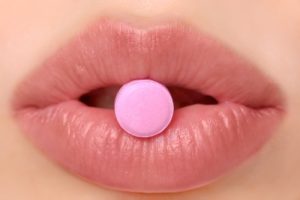 For decades men have relied on the ‘little blue pill’ to boost sexual performance and desire. Women continued to ask when their own needs would be addressed, as lack of desire, especially post-menopause, continued to diminish. Well, today is the day ladies, and your prayers have been answered; the U.S. Food and Drug Administration (FDA) has officially approved the ‘pink pill’ to boost female sexual desire.
For decades men have relied on the ‘little blue pill’ to boost sexual performance and desire. Women continued to ask when their own needs would be addressed, as lack of desire, especially post-menopause, continued to diminish. Well, today is the day ladies, and your prayers have been answered; the U.S. Food and Drug Administration (FDA) has officially approved the ‘pink pill’ to boost female sexual desire.
Discussions surrounding the potential ‘pink pill’ for women started in June, 2015. The drug, which will be sold under the name Addyi but is called Flibanserin, works to change female hormones as a means of boosting sexual desire. The blue pill, on the other hand, works to fix a male’s physical mechanism by increasing blood flow to the penis. You can see how men and women have different needs when it comes to sex.
Advertisement
Director of the FDA’s Center for Drug Evaluation and Research said, “Today’s approval provides women distressed by their low sexual desire with an approved treatment option. The FDA strives to protect and advance the health of women, and we are committed to supporting the development of safe and effective treatments for female sexual dysfunction.”
Although women may finally be rejoicing, it’s important to understand Addyi a bit more. First and foremost, Addyi is intended for premenopausal women, even though a decline in sexual desire if often seen in postmenopausal women. Additionally, unlike the blue pill where you take one and go, the pink pill must be taken daily for at least 30 days for noticeable effects. Lastly, women taking oral contraceptives or who consume alcohol should be weary as Addyi can interact negatively with these as well.
Addyi was approved based on three, 24-week randomized, double-blind placebo-controlled clinical trials which involved 2,400 premenopausal women who suffer from hypoactive sexual desire disorder (HSDD). HSDD results in low sexual desire not related to another medical or psychiatric condition.
The average age of the participants was 36 and they had HSDD for at least five years. Over four weeks the women reported on satisfying sexual events, sexual desire and distress related to low sexual desire. Although Addyi has been shown to improve desire in women, it does not increase sexual performance.
Advertisement
Side effects associated with Addyi include dizziness, sleepiness, nausea, fatigue, insomnia and dry mouth. Addyi has the potential to cause low blood pressure and syncope – loss of consciousness. Taking Addyi with certain medications may lead to issues, such as the drug breaking down. For these reasons Addyi can only be prescribed from by healthcare professional.
Addyi was produced by Sprout Pharmaceuticals based in North Carolina.
